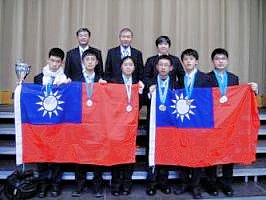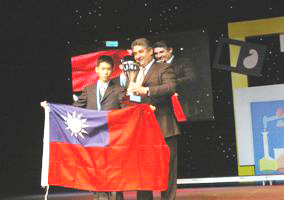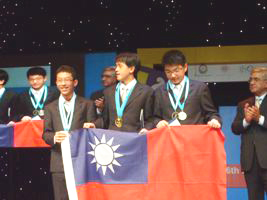Taiwan Wins 4 Gold and 2 Silver Medals at 6th International Junior Science Olympiad in 2009

On December 11, good news was received from the Taiwanese contestants in the 6th International Junior Science Olympiad in 2009. They had won 4 gold and 2 silver medals and had ranked second among the 45 countries that sent a total of 258 students to compete in the event. Taiwan, Russia and Germany were all awarded 4 golds and 2 silvers but, unfortunately, Russia outscored Taiwan by a tiny margin and walked away with the team trophy. Additionally, Zhang Zherui of the Taiwan Team was given the Best Theory Award, while the teamwork of Lin Guanyu, Guo Xiaolan and Zhang Xuanhao won a bronze medal in teamed experiment competition-the first time Taiwan has won a medal in this category, indicating improvement of Taiwanese students' ability to do experiments.
The six students selected to represent Taiwan were trained by a coaching team headed by Associate Research Fellow Lo Peihua from the Science Education Center of National Taiwan Normal University. According to Lo Paihua, the scoring system this year was different from that of previous years. The experiment scores were also taken into account and, therefore, a team had to score high on the experiment to win. This explains why the
| Name | Gender | School | Award Won |
| Zhang Zherui | M | Taipei Municipal Jianguo High School | Gold Medal and Best Theory Award |
| Guo Xiaolan | M | Taipei Municipal Jianguo High School | Gold Medal and Team Experiment Bronze Medal |
| Zhang Xuanhao | M | Taipei Wego Private Senior High School | Gold Medal and Team Experiment Bronze Medal |
| Xie Junting | M | Taipei Long Men Junior High School | Silver Medal |
| Lin Guanyu | M | National Taichung First Senior High School | Gold Medal and Team Experiment Bronze Medal |
| Guo Yuting | F | National Taichung First Senior High School | Silver Medal |
The International Junior Science Olympiad is an integrated competition in natural science disciplines (mathematics, physics, chemistry, biology and earth sciences) to cultivate the interest of young students in science. The contestants have to be under 16 years of age. The competition is divided into three parts: test examination, theoretical examination and experimental examination. Next year, the Olympiad will be held in


medal